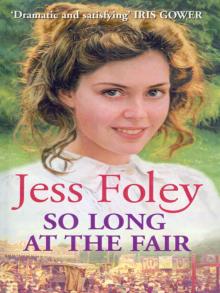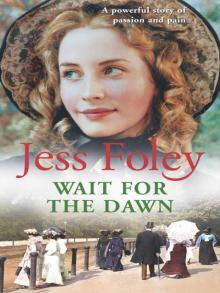- Home
- Jess Foley
So Long At the Fair
So Long At the Fair Read online
So Long At the Fair
Jess Foley
Random House (2001)
* * *
Tags: Sagas, Fiction
Synopsis
Growing up in a small Wiltshire village, Abbie Morris knows what lies ahead of her - a life of drudgery as a menial servant, like that of her sisters. But everything changes when Abbie is twelve and their emotional, spirited mother casts them into a crisis for which no one is prepared. Six years later the Morris family have rebuilt their lives, and when Abbie and Beatie, Abbie's adored elder sister, set off for the county fair, the world seems a good place. But their new-found happiness is not to last. A chance encounter with Louis, a personable, handsome stranger, leads to tragedy and has repercussions that threaten to destroy Abbie's peace of mind for ever. Abbie struggles to forget what happened that night, to get on with her life, but when she meets charming, honourable Arthur - and re-encounters Louis - it becomes clear that she might never recover from the night they stayed so long at the fair...
About the Author
Jess Foley was born in Wiltshire but moved to London to study at the Chelsea School of Art, then subsequently worked as a painter and actor before taking up writing. Now living in Blackheath, south-east London, Jess is currently working on a new novel Too Close To The Sun.
Praise for So Long at the Fair
‘Jess has really captured the sense of a family united against great odds. The heroine, Abbie, is strong but flawed as all good heroines should be and as we follow her triumphs and trials we see her change from a girl to a woman in the most dramatic and satisfying of ways’ Iris Gower
‘A jolly good read . . . Abbie is a great character, buffeted by fate but a powerful woman of her time’ Susan Sallis
This ebook is sold subject to the condition that it shall not, by way of trade or otherwise, be lent, resold, hired out or otherwise circulated without the publisher’s prior consent in any form (including any digital form) other than this in which it is published and without a similar condition including this condition being imposed on the subsequent purchaser.
Epub ISBN: 9781446429808
Version 1.0
www.randomhouse.co.uk
Published by Arrow Books in 2002
2 4 6 8 10 9 7 5 3 1
Copyright © Jess Foley 2001
Jess Foley has asserted the right under the
Copyright, Designs and Patents Act, 1988 to be identified
as the author of this work
This novel is a work of fiction. Names and characters
are the product of the author’s imagination and any resemblance
to actual persons, living or dead, is entirely coincidental
First published in the United Kingdom in 2001 by Century
Arrow Books
The Random House Group Limited
20 Vauxhall Bridge Road, London SW1V 2SA
Random House Australia (Pty) Limited
20 Alfred Street, Milsons Point, Sydney,
New South Wales 2061, Australia
Random House New Zealand Limited
18 Poland Road, Glenfield
Auckland 10, New Zealand
Random House (Pty) Limited
Endulini, 5a Jubilee Road, Parktown 2193, South Africa
The Random House Group Limited Reg. No. 954009
www.randomhouse.co.uk
A CIP catalogue record for this book
is available from the British Library
ISBN 0 09 9415763
Contents
Cover
About the Author
Praise for So Long At The Fair
Title Page
Copyright
Dedication
Part One
Chapter One
Chapter Two
Chapter Three
Chapter Four
Part Two
Chapter Five
Chapter Six
Chapter Seven
Chapter Eight
Chapter Nine
Chapter Ten
Part Three
Chapter Eleven
Chapter Twelve
Chapter Thirteen
Chapter Fourteen
Chapter Fifteen
Chapter Sixteen
Chapter Seventeen
Chapter Eighteen
Chapter Nineteen
Part Four
Chapter Twenty
Chapter Twenty-One
Chapter Twenty-Two
Chapter Twenty-Three
Chapter Twenty-Four
Chapter Twenty-Five
Chapter Twenty-Six
Chapter Twenty-Seven
Part Five
Chapter Twenty-Eight
Chapter Twenty-Nine
Chapter Thirty
Chapter Thirty-One
Chapter Thirty-Two
Part Six
Chapter Thirty-Three
Chapter Thirty-Four
Chapter Thirty-Five
Chapter Thirty-Six
Chapter Thirty-Seven
Chapter Thirty-Eight
Chapter Thirty-Nine
For Victor
PART ONE
Chapter One
In the near darkness Abbie’s foot struck an old tin tray that Lizzie had earlier leant against the table leg. It fell with a clatter. She froze, waiting.
‘What are you doin’ down ’ere?’
She turned at the sound of her brother Eddie’s voice. She could just make him out in the shadows, sitting up in his bed on the far side of the room. ‘I’m sorry,’ she said. ‘I didn’t mean to wake you.’ Her voice bore the broad accents of the West Country, though not so pronounced as his.
‘Well, you did,’ Eddie said. ‘What’re you doin’ down ’ere, anyway?’
‘Hush,’ she said, ‘you’ll wake the little ’uns. I came down to get a drink of water.’
‘Then for God’s sake get it and leave me in peace. I got to work in the morning.’
Abbie drank from the china mug she held. ‘Eddie,’ she said, ‘Mam’s gone out.’
‘Gone out? What d’you mean?’
‘What I said. She’s gone out – somewhere.’
Eddie struck a match, put the flame to the candle and looked at the clock. ‘It’s gettin’ on for one,’ he said.
Abbie gazed through the window. From behind her came the sounds of Eddie getting out of bed and pulling on his trousers. After a few moments he came towards her, the light from the candle making the shadows dance. She turned to him as he stopped by the table, the candle flame lighting up his grave, earnest face and catching dull gold in his tousled hair. ‘You didn’t hear her leave?’ Abbie asked. Her hair, much darker than her brother’s, had for the night been fashioned into a single plait that hung down her back. She had turned twelve earlier that month of July 1862. Eddie would soon be fourteen.
‘I didn’t ’ear a thing,’ Eddie answered. ‘When did she leave, d’you know?’
‘Ages ago. Soon after ten, I reckon.’
A pause, then he said, ‘Go on back to bed. You’ll catch cold sitting down ’ere.’
Glancing at the range, Abbie saw that the fire had almost completely burned out. ‘Where can she have got to, Eddie?’ she said.
‘I dunno. But she’ll be back soon, I don’t doubt.’
Abbie studied him in the pale light. His lips were compressed, his grey eyes unreadable, shadowed pools. Moving forward, he set the candleholder on the small table beside the window and sat down next to her on the seat. In the short silence that followed, the church clock struck the hour of one.
‘I couldn’t sleep,’ Abbie said. ‘I heard her go down the stairs and waited for her to come back, but she didn’t. When I went into her bedroom I saw that her bed’s not
been slept in.’ She paused. ‘It’s not the first time. Did you know that?’
‘No, I didn’t.’
‘She went out last week, too – while you were staying at the farm and Father was in Frome. She was quiet but I still heard the door. When I went to the window I saw her goin’ up the lane. It was just gone ten.’
‘Did you ask ’er where she went?’
‘No fear. She’d only get mad.’ She sighed. ‘I wish Father was here.’
‘Well, ’e won’t be back till Sat’day.’
‘I know that. I don’t like it when he works away. I like him to be here.’
‘Well, you’ll be off yourself soon. So you’ll ’ave to get used to bein’ without ’im.’
Silence but for the ticking of the clock and the occasional creaks of the cottage’s settling timbers. Eddie said, ‘Well, there’s no point in us sittin’ ’ere. And she won’t like it if she comes back and finds us up. Anyway, I’m sure she’ve got a good reason. She wouldn’t go off just for nothin’.’ He stood up. ‘I’m goin’ back to bed.’
Abbie didn’t move. ‘Leave the candle,’ she said.
He moved away across the room and Abbie heard the sounds of him returning to his bed. Alone at the window, she gazed out. The scent of the geraniums in the pot on the ledge was fragrant in her nostrils. In the moonlight the roofs and chimneys of the cottages on the other side of the lane were dark silhouettes against the sky. Looking to the left, she could see the wooded hills, beyond which lay the town of Frome. Somewhere an owl hooted. The lane was deserted.
She thought again of her mother having gone out the previous week. The following morning Abbie had found her sitting on her bed, her face in her hands. Closing the door behind her, so as not to alert Lizzie and Iris, Abbie had gone to her. ‘Mam – are you all right?’ Abbie’s voice had been uncertain, tentative, for often, and sometimes when least expected, her mother would react in irritation and anger. This time, though, she had only shaken her head. But then a muffled sob had escaped her and Abbie had realized that she was crying. ‘Oh, Mam, what’s the matter?’
‘Nothing.’
Her mother had shaken her head, lowering her hands so that Abbie had seen the redness in her eyes, the tears on her cheek. She was usually so pretty, but not now, not like this.
‘I’m all right,’ her mother had said, wiping her cheeks with her fingers. ‘Go on back downstairs.’
Abbie had done as she was told, but now as the memory returned she realized that there had been anger as well as sorrow in her mother’s tears.
Turning her head, she looked to the right and suddenly there was the figure of her mother coming along the lane. Quickly she rose, picked up the candle and crossed the room. She set it down on the chair next to Eddie’s bed and blew out the flame. ‘Mam’s just coming,’ she whispered – not knowing whether he was awake or asleep – and then, hurrying in the dark, started up the stairs.
She entered the bedroom quietly, closing the door behind her. There were two beds, separated one from the other by the rag rug she had made the year before. In one bed her two younger sisters, Iris and Lizzie, lay asleep. Getting into the other bed she pulled the blanket up to her chin and closed her eyes.
After a little while she heard the soft sound of footfalls on the stairs. Moments later the door opened.
‘Abigail?’ The voice came in a whisper.
Abbie said nothing, hoping her mother would think she was asleep.
The whispered voice came again. ‘Abbie?’ A pause. ‘I know you’re awake so you might as well answer me.’
After a moment Abbie sat up. ‘Yes, Mam?’
‘Come into my bedroom. I want to talk to you. And don’t wake your sisters.’
As her mother turned away, Abbie pushed the blankets back, got out of bed and, in the dark, crept out onto the landing. The door opposite, that to her parents’ room, was open. Abbie went in. Her mother had lit a candle and was standing beside the bed. ‘Close the door behind you,’ she said.
Abbie did so.
‘What were you doing up?’ Her mother’s voice held a note of barely contained suspicion and anger. ‘And don’t say you weren’t. I saw you at the window.’
‘I was waiting for you. I wondered where you were.’
‘What were you doing – spying on me?’
‘Oh, Mam, no. I – I heard you go out and you didn’t come back. I began to get worried.’ She noticed that her mother was wearing her best blouse beneath her coat. ‘Mam, please,’ she said, ‘don’t be angry with me.’
Her mother glared at her. She was a woman of middle height, with small, delicate features, still pretty for her thirty-eight years. Her cheeks, Abbie noticed, were unusually flushed, while her dark hair, usually neatly braided and pinned to her crown, hung loose about her shoulders. Her brown eyes were cold.
‘Does anyone else know I’ve been out? Does Eddie know?’
Abbie nodded. ‘Yes – I’m afraid I woke him up.’
‘You would. What did he say?’
‘Nothing. He wondered where you’d gone.’
Her mother sat down on the bed, rested her chin in her hand and sighed.
Abbie sat down beside her. ‘Mam,’ she said, ‘what’s happening?’
‘What?’ Her mother turned to her, dark eyes widening slightly as if coming out of a dream. ‘What do you mean?’
‘Something’s happening. I don’t know what it is.’ In the light of the candle Abbie saw that her mother’s mouth appeared a little reddened, as if her lips were slightly inflamed.
Her mother gave a melancholy little smile. ‘You wouldn’t understand.’
The thought went through Abbie’s mind that so often lately her mother appeared unhappy. Not that she had ever been a woman who laughed a great deal, not like Jane’s mother. Ever since Abbie had been old enough to be aware, she had sensed a certain reserve about her mother – as if for some reason she had kept around her some fine, invisible shield. Out of fear? Out of contempt?
Abbie said, ‘If there’s something worrying you, Mam, per’aps you ought to tell Father about it.’
Her mother raised an eyebrow. ‘Tell your father? Oh, yes, you think your father can solve every problem, don’t you? One day you’ll learn.’ With a faint snort of scorn she turned away. ‘God, how I hate this place.’
‘Oh, Mam, don’t say that!’ Abbie moved closer to her, putting her arms around her. Not that she expected the gesture to bring any closeness, and she was not surprised when her mother gently extricated herself from the embrace. She had never been at ease with displays of affection – which was odd, Abbie sometimes thought, considering her appetite for romantic novels.
‘Do you really hate it?’ Abbie asked. It had never occurred to her that life in Flaxdown could be loved or hated. It was the way it was, and that was that.
‘Sometimes, yes,’ her mother said.
‘Do you miss London?’
‘London . . .’ Her mother said the word as if she were examining some unusual, prized object. ‘Oh, London is the place. No question of that.’
In earlier years it had been a matter of some pride to Abbie that her mother had been born in London. At school it had given her a touch of specialness, as almost without exception the parents of the other children had been born in and around the village. That Abbie’s mother had come from Highgate in London before her marriage and had a different accent from the rest of the village women had set Abbie a little apart and made her – quite unwarrantedly, of course – something of an authority where London was concerned.
Abbie’s mother – Elizabeth Porter as she then was – had come to Wiltshire in her employment as governess to the child of a wealthy family who owned a house in London’s Kensington and a country home near Hallowford. While at the country retreat in the summer of 1843, she had met there Frank Morris, a handsome young bricklayer who had come to work on the building of an extension to the house. Elizabeth had been nineteen and Frank twenty-three. They had married the follow
ing April, and Beatrice, their first child, had been born eleven months later.
‘Would you like to go back there,’ Abbie asked, ‘to London?’
‘Go back?’ her mother said. ‘No, I shall stay here till I die, I don’t doubt.’ She was quiet for a while, then turned to Abbie sitting beside her. ‘Go on to bed now.’
Abbie nodded, got up and silently on her bare feet moved to the door. As she reached it her mother’s voice came from behind her: ‘Don’t say anything to your father when he gets back. About my going out, I mean. Nor Beatie when she comes on Sunday.’
‘All right.’
A little silence, then her mother said, ‘If you want to know where I was tonight, I went to see Mrs Marling.’
‘Has she had her baby?’
‘Not yet. It’s due any day. I just . . . went to sit with her for a while. She needs somebody, and that husband of hers is as useless as a collander in a rainstorm.’
Abbie nodded, relieved. She had known all along that there would be a reasonable answer to the mystery of her mother’s absence. Also, she welcomed the revelation as it showed a new side to her mother’s character – a side Abbie had not seen before. Usually her mother was not one to associate much with the other women in the village – at least not to the point where she could actually be said to be a friend of any of them. The other women were always popping in and out of each other’s houses, breaking up their days with little gossips. Not Abbie’s mother. She had always frowned upon such a practice and kept herself aloof from such needs.
‘Still,’ Mrs Morris was saying, ‘there’s no need for your father to know. He’d get mad to think of you all left alone. You were all right, though, weren’t you?’
‘Yes, of course.’
In the bedroom across the landing Abbie climbed into bed and closed her eyes. Although she now knew the reason for her mother’s absence from the cottage a sense of unease still nagged at her. On the Sunday night before her father had left for Trowbridge she had heard her parents quarrelling again, the bitter sounds of her mother’s voice coming from their bedroom, and then the more subdued tones of her father. She had not been able to distinguish their words, so she’d had no idea what they had been quarrelling about. Could it have been about her schooling ending and her going away into service? This had been a subject of altercation between them recently. Though it was not the only one. And anyway, quarrels were not a new phenomenon. Not like her mother’s tears. And she saw her mother again as she had been tonight, sitting despondently with her red lips and her hair loose. And then her words: ‘God, how I hate this place.’ With an effort Abbie tried to thrust the thoughts from her mind. It didn’t do to dwell on such things. Whatever it was, in time it would all come right.

 Too Close to the Sun
Too Close to the Sun So Long At the Fair
So Long At the Fair Wait For the Dawn
Wait For the Dawn Saddle the Wind
Saddle the Wind No Wings to Fly
No Wings to Fly